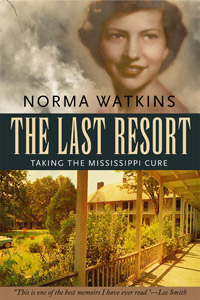Interview with Norma Watkins, 3 of 3
 This is the last part of my interview with Norma Watkins–check out part 1 and part 2 if you missed them.
This is the last part of my interview with Norma Watkins–check out part 1 and part 2 if you missed them.
These questions focus on writing, memoir in particular.
Angela: Early in The Last Resort, you, as the narrator, ask, “If I got that wrong, what else have I misremembered?” Sometimes I am tempted to write each scene of my memoir as if I’m on a witness stand. Would you talk a little bit about the roles of memory and imagination in narrative nonfiction?
Norma: I always tried to check the facts, but in any memoir, the truth is the narrator’s. My cousin John Fontaine’s reaction to my book was: “If ten people had written this, there would be ten different stories.” That’s true. Self-perception is flawed because we stand inside what we are trying to see. People in Mississippi objected to my depictions of others: My father was more charming and caring; my cousin was not a bully; they didn’t drink that much. The only answer you can give is to invite the critics to write their own memoirs.
Angela: Writers in my workshops are often concerned about the reactions of family and friends, past and present. What advice would you give them, and me, about worrying about what other people will think?
Norma: This is a huge concern in the South. Whatever you say will kill your mother. I offer several outs: use the mask of fiction; tell readers you have changed names; change your name; or wait until they die. I personally like what James Houston said: “Write now; worry later.” Telling the truth is an act of courage.
Angela: Sometimes I find the critic/teacher side of myself analyzing and editing faster than my writer side can write. You’ve got a similar background to mine—how do you keep the inner critic from taking over?
Norma: When you’re creating a story, you have to turn the critic/teacher off. Lose yourself in the tale, in dialogue and scene. Escape into the dream of the story. There’s plenty of time to bring the finicky critic back in revision.
Angela: In your acknowledgments, you thank your writing group, “Mixed Pickles.” What advice would you give to a writer who wants to form a group?
Norma: I love my writing group. We have worked together for so long, we are able to give each other good advice and criticism without fear of wounded feelings. We become co-creators for one another—“Have you thought about this?” “What if…” I would say to people wanting to start a group, take a class and notice the students who seem on your wave length. It’s good for members of the group to be, within reason, at the same writing level, so you aren’t spending all your time with a beginner.
I have thanked Norma privately, but want to thank her publicly now for being so gracious in answering my questions. Thanks, Norma!





Comments are closed